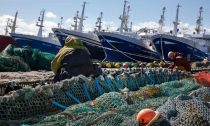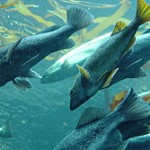
A fleet of Russian supertrawlers has been spotted fishing off the coast of Scotland in a protected area, raising concerns by environmentalists over the impact of industrial vessels on marine life in UK waters. The 11 vessels, among the largest trawlers in the world, have spent “significant time” fishing in the Wyville-Thomson Ridge, a British special area of conservation (SAC), according to data analysed by Greenpeace.
The vessels, each more than 100 metres long and capable of processing hundreds of tonnes of fish every day, are believed to be targeting blue whiting, a pelagic species that lives in midwater.
The fleet is operating legally, according to the Scottish government. The area, to the west of the Shetland Islands, is within waters shared by the UK and the Faroe Islands. It is managed jointly, but governed by the Faroese government under a special treaty. Its designation as a SAC by the European Union does not prevent commercial fishing in the area.
Environmentalists condemned the “destructive” practices of supertrawlers and called on the UK government to better regulate their activities to protect marine life.
Chris Thorne, an oceans campaigner at Greenpeace UK, called for a ban on supertrawlers in UK marine protected areas. He said: “While the UK is in lockdown, this fleet of destructive supertrawlers has been plundering fish from what is supposed to be a protected area in UK waters.
“The intensity with which these vast ships fish is not compatible with a healthy ocean. They drag vast nets, up to one-mile long, in their wake hoovering up fish and other marine life and disturbing the entire water column.”
“If the UK government wants to be taken seriously as a world leader in marine protection, it must do more to restrict and regulate the activities of the international supertrawler fleet, and support small scale, sustainable fishing communities.”
Lockdown measures and a drop in the fish export market due to coronavirus has forced many of the UK’s small scale, more sustainable fishing boats to tie up at port, unable to work.
The Wyville-Thomson ridge SAC sits on reef at the edge of Scotland’s continental shelf. It “supports diverse biological communities representative of hard substratum in deep water” according to the Joint Nature Conservation Committee.
John Hourston, a volunteer with the Blue Planet Society, which campaigns against the bycatch of dolphins in fishing nets, called for better monitoring and more regulation.
“These factory trawlers can stay at sea for weeks. They have nets with mouths that could swallow three jumbo jets. The problem is dolphins feed on these fish in midwater when they aggregate to spawn,” he said.
“You drag a net through these fish and you will also catch what is feeding on them. There needs to be more regulation around the pelagic supertrawler fleet.”
Studies have shown high bycatch rates of dolphins in pelagic trawlers targeting blue whiting and European sea bass in the Bay of Biscay.
A spokesman for the Scottish government said while the SAC was within the UK continental shelf limit of the seabed, the responsibility of the waters above it were joint.
“We are aware that a multinational fleet is legitimately operating in shared waters under the Faroese government’s authority, and has done for a number of years,” he said. “They are targeting blue whiting, a species caught with nets that do not contact the seabed.”
It was monitoring the vessels, via marine protection patrol boats and electronic surveillance, “to ensure there are no infringements and none have strayed into areas that are exclusively within UK fishery limits or the Scottish zone”, he said.
Earlier this month, conservation groups expressed alarm over lower levels of surveillance of fishing operations during the coronavirus pandemic after lobbying from fishing fleets.
Several companies operating the trawlers did not immediately respond to requests for comment.













Social Profiles